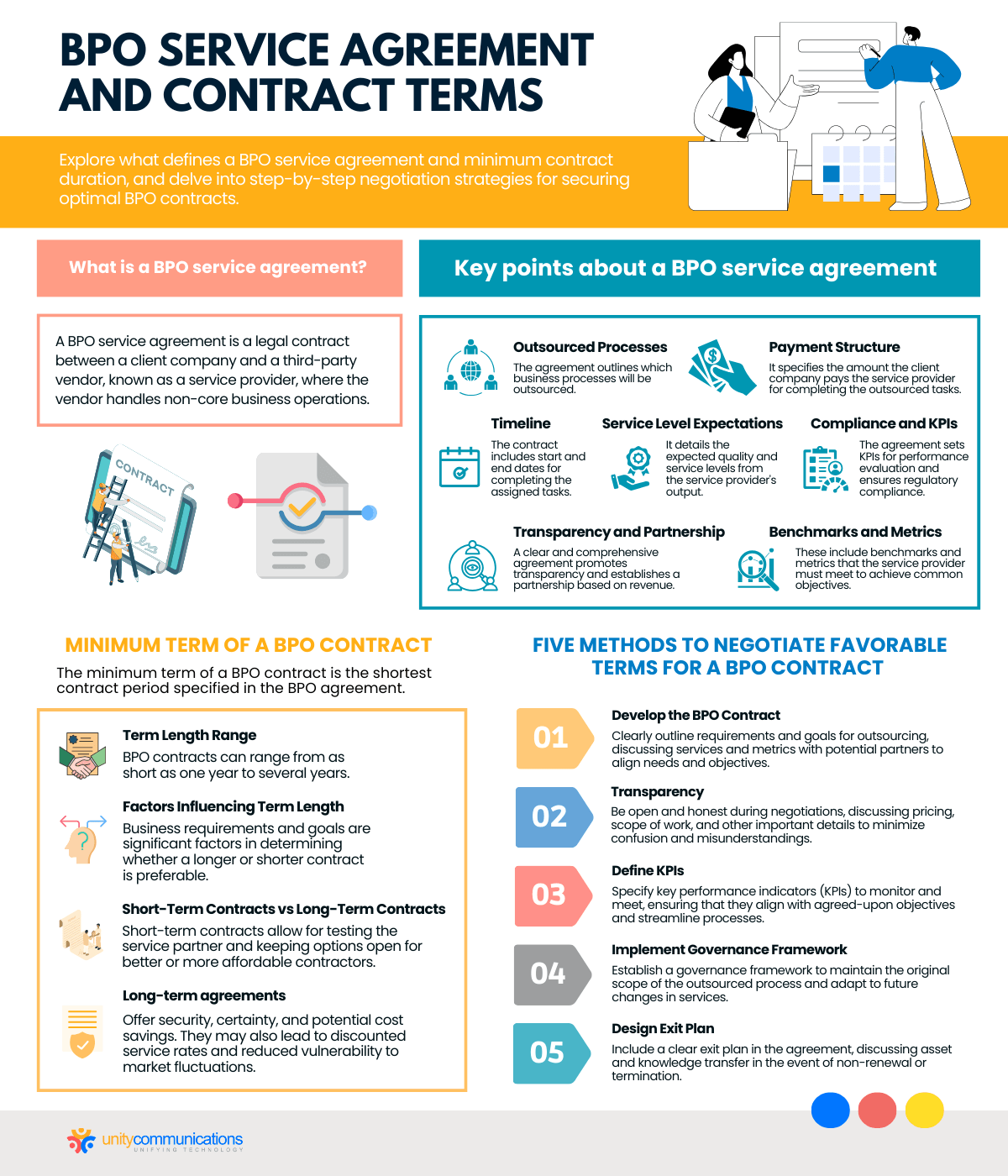Table of Contents
The primary goal of partnering with a business process outsourcing (BPO) company is to improve operations and reduce costs. However, entrepreneurs, executives, and key decision-makers might find it challenging to achieve these goals when they do not outsource correctly.
This article is for you if you have already heard of the benefits of outsourcing and are considering it for your business. It discusses the minimum term of a BPO contract, what a BPO service agreement is, and some valuable steps and tips.
Keep reading to learn more about how outsourcing agreements work.
What Is a BPO Service Agreement?

A BPO service agreement is a legal contract between you, as the client company, and a third-party vendor or contractor, commonly known as a service provider. So what is the BPO provider’s role? Under this official deal, the third-party outsourcing vendor handles the non-core operations of your business, whether back-end or front-end processes.
The outsourced processes included in the conditions and terms of a BPO contract vary. Below are some roles to outsource to a BPO company:
- Appointment setting
- Bookkeeping and accounting
- Customer service, including call centers
- Data entry
- Human resources (HR)
- Sales or marketing support
- Technical or information technology (IT) support
The BPO contract is a formal agreement in which you pay the service provider a certain amount to accomplish the outsourced business process. The terms of a BPO contract often include specific beginning and end dates within which third-party workers must finish assigned business functions and the service level or quality expected from their output.
The business process outsourcing agreement is significant as it specifies the business operations and duties you and the third-party service provider must fulfill. Specifications include the type of work and service you want from the BPO company, regulatory compliance, and the key performance indicators (KPIs) to satisfy.
A clear and thorough BPO service agreement promotes transparency and a revenue-based partnership between you and the BPO vendor. The conditions and terms of a BPO contract also involve benchmarks and other metrics that the offshore BPO provider (or other types of outsourcing companies) must meet to reach common objectives.
What Does the Minimum Term of a BPO Contract Mean?
The minimum term of a BPO contract is the shortest contract period available for a given BPO agreement. If you enter into a formal deal with a specified contract duration, you will generally incur a penalty for canceling it before the stipulated contract period expires.
Worse, the other party might sue you for breach of contract. Accepting the minimum term and signing a BPO contract ensures the conditions and provisions are legally binding. Your business partner can take legal action as soon as the contract’s duration is over. This provision also applies to the BPO provider, should it be the one that cancels or breaks the deal.
One of the main factors affecting the minimum term of a BPO contract is your business’s requirements and goals. A longer contract duration might be ideal if you want security and certainty and want to partner with a trusted BPO provider. In contrast, a shorter contract length might be useful if you plan to work with a new partner that has yet to be proven effective.
How Long or Short Is the Term of a BPO Contract?
Depending on the project, the term of a BPO contract can be as short as one year or less. However, if you find a reliable BPO partner, you can pursue a mutually beneficial business relationship lasting several years.
As mentioned earlier, one benefit of short-term deals is that you can test your service partner first. They allow you to keep your options open for better or more affordable third-party contractors.
On the other hand, long-term BPO agreements offer security, certainty, and reduced costs. You can receive special or discounted service rates when the partner considers you one of its prized clients. Additionally, you are likely less affected by any price increases due to market volatility.
Negotiating Favorable BPO Service Agreements

Consider these five methods to negotiate favorable terms for a BPO contract and other service agreements:
- Develop the BPO contract. List the requirements and goals for outsourcing. Detailing them will help you identify what should be emphasized in the contract. Discuss the services and metrics you need with the potential partner. Note the vendor’s advice and concerns. Match them with your needs and objectives.
- Be straightforward and transparent. Speak your mind. During early negotiations, talk with the prospective BPO company about exact pricing, scope of work or services, and other important matters. Clarifying these points helps minimize confusion, doubts, and misunderstandings that might lead to problems during outsourcing.
- Name the KPIs. Specify to the BPO partner the KPIs to monitor and meet. Doing so helps the BPO provider deliver accurate services. The metrics must represent the requirements and goals that the third-party provider agreed to address. They should streamline the current processes or improve the bottom line.
- Implement a governance framework. This framework is essential when bargaining for an acceptable term for a BPO contract. It assures that the outsourced process’s original scope is maintained while delegated to another service provider. It also helps you respond to future changes in services.
- Design an exit plan. Integrate a proper or graceful exit in the BPO service agreement. Discuss with the service provider what assets or knowledge will be transferred to you if the contract is not renewed and similar points.
Best Practices for Managing BPO Contracts
Follow these useful tips to manage the engagement after getting favorable terms for a BPO contract:
- Make your best team manage the contract. Assign skilled professionals focused on handling contracts and relationships. They must cover all aspects, including performance, technical, financial, and risk management. Your team must have at least one seasoned manager who can resolve a crisis as quickly and properly as possible.
- Monitor every result of the outsourced tasks. Document all the outcomes of the project as they are delivered. Design a clear plan listing the project type, the performance, and the due date. Conduct regular reporting of the results and compare them to the requirements stated in the contract.
- Build effective communication means. Ensure solid interaction between both parties. Establish constant communication to get updates on task progress. Meet online and in person, if possible and necessary. Regular meetings about the project strengthen mutual trust and enable immediate problem resolution.
- Opt to share space with the BPO partner. While this might be a challenge when outsourcing to a BPO provider far from your main office, collaborating in the same place can strengthen your business relationship. It gives you more control over delegated processes and lets you discuss and brainstorm solutions as a unit.
- Record all modifications or changes to the contract. Keep track of all the adjustments or revisions made to the terms of the BPO contract. Every change can impact the operation. It is best to document them instead of agreeing to them verbally.
The Bottom Line

Remember to include all pertinent information in your outsourcing agreement to ensure complete understanding. In many circumstances, a fully prepared and well-written BPO service agreement can be a significant step toward a successful outsourcing venture.
Additionally, effective contract management is vital to success. Business relationships are not only organizational but also personal. Human contact can make or break an outsourcing activity. If you and your partner gain each other’s trust, handling the contract will be less challenging.
Let’s connect if you want to learn more about the terms of a BPO contract and other service agreements!




